|
|
|
Sort Order |
|
|
|
Items / Page
|
|
|
|
|
|
|
| Srl | Item |
| 1 |
ID:
145124
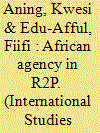

|
|
|
|
|
| Summary/Abstract |
Both the African Union (AU) and the Economic Community of West African States (ECOWAS) have been global leaders in embracing and operationalizing responsibility to protect (R2P). The adoption of the AU’s Constitutive Act, Article 4 (h) in 2000, has transformed its old-fashioned principle of noninterference to one of nonindifference. This authorizes the AU to intervene in Member States with respect to war crimes, genocide, ethnic cleansing, and crimes against humanity. ECOWAS has through its conflict prevention, management, and resolution protocol and its conflict prevention framework deepened and practicalized the notion of sovereignty as responsibility. These frameworks from both the AU and the ECOWAS have close similarities to the R2P norms. However, although these notions are captured in official documents, their actual operationalization faces challenges relating to sovereignty, limited institutional capacity, a restricted appetite for enforcement action, and a lack of explicit instruments to activate their intervention clauses in R2P-like situations. In spite of these challenges, the article argues that the initiatives of both the AU and the ECOWAS in Mali, Cote d’Ivoire, and Libya demonstrated a positively active African agency in contributing to global peace processes. This article, therefore, assesses the successes and limitations of African regional agency in enforcing R2P-like norms among its member states and its implications for and contributions to global international relations discourses.
|
|
|
|
|
|
|
|
|
|
|
|
|
|
|
|
| 2 |
ID:
115836
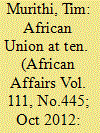

|
|
|
|
|
| Publication |
2012.
|
| Summary/Abstract |
AS THE AFRICAN UNION MARKED ITS TENTH ANNIVERSARY on 9 July 2012, it was still recovering from one of its most public disagreements. At the heart of this disagreement was the AU's interpretation of and commitment to good governance and humanitarian intervention. Sparked by the uprisings in Tunisia, Egypt, and Libya, and the contested November 2010 elections in Côte d'Ivoire, these issues came under intense debate. The NATO-led intervention in Libya - the AU's backyard - caught the organization unaware and divided its members on whether the military incursion, under the rubric of the UN doctrine of the 'responsibility to protect' (R2P), was warranted. Similarly, the earlier crisis in Côte d'Ivoire and the involvement of the UN and France led to criticisms of the AU's failure to respond in a unified and coherent manner.
|
|
|
|
|
|
|
|
|
|
|
|
|
|
|
|
| 3 |
ID:
157988
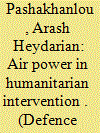

|
|
|
|
|
| Summary/Abstract |
It would be hard to overstate the importance of air power in humanitarian intervention (HI) and the Responsibility to Protect (R2P). Yet, the role of air power in HI and R2P has been understudied. This article seeks to remedy the lack of systematic investigation. It does so by developing a framework for assessing the effectiveness of air power during military operations in HI and R2P and applies it to NATO’s air campaigns in Kosovo (Operation Allied Force) and Libya (Operation Unified Protector). Upon examination NATO is revealed to have fared better in Libya than Kosovo in positively accomplishing its stated humanitarian objectives, minimizing collateral damage and reducing the costs for the interveners, all of which are aspects considered by the model. The relative effectiveness of Operations Unified Protector is generally attributed to geography, diplomacy and technology. It is argued that better ground support, unmanned aerial vehicles (UAVs) and burden sharing are needed to enhance the utility of air power in HI and R2P even further.
|
|
|
|
|
|
|
|
|
|
|
|
|
|
|
|
| 4 |
ID:
173227
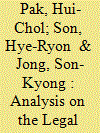

|
|
|
|
|
| Summary/Abstract |
At present, some states are undertaking military interventions in different parts of the world, contending the ‘legitimacy’ of their i006Evocation of responsibility to protect civilians from a humanitarian crisis. Discussions at international forums concerning the concept of Responsibility to Protect (R2P) are inconclusive about its legal nature and application. While some scholars and states support the doctrine of R2P as being legitimate, others challenge or take a rather sceptical view. Divergent views seem to be originating from its incompatibilities with the rules of international law, including the Charter of the United Nations. What is controversial is that the supporters of R2P are mainly from the West, while objections to R2P are from developing countries mainly from West Asia or Africa. This raises concerns about the possibility of future applications of R2P in any of the countries in these regions or other developing countries. The article, analyses the legal nature of R2P in terms of the main principles of international law and other sources of international law and argues that the legitimacy and international legal effect of R2P are uncertain.
|
|
|
|
|
|
|
|
|
|
|
|
|
|
|
|
| 5 |
ID:
139840
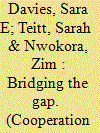

|
|
|
|
|
| Summary/Abstract |
Women, Peace and Security (WPS) scholars and practitioners have expressed reservations about the Responsibility to Protect (R2P) principle because of its popular use as a synonym for armed humanitarian intervention. On the other hand, R2P’s early failure to engage with and advance WPS efforts such as United Nations Security Council (UNSC) resolution 1325 (2000) has seen the perpetuation of limited roles ascribed to women in implementing the R2P principle. As a result, there has been a knowledge and practice gap between the R2P and WPS agendas, despite the fact that their advocates share common goals in relation to the prevention of atrocities and protection of populations. In this article we propose to examine just one of the potential avenues for aligning the WPS agenda and R2P principle in a way that is beneficial to both and strengthens the pursuit of a shared goal – prevention. We argue that the development and inclusion of gender-specific indicators – particularly economic, social and political discriminatory practices against women – has the potential to improve the capacity of early warning frameworks to forecast future mass atrocities.
|
|
|
|
|
|
|
|
|
|
|
|
|
|
|
|
| 6 |
ID:
147603
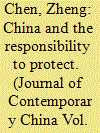

|
|
|
|
|
| Summary/Abstract |
This article investigates the Chinese government’s evolving policies toward the emerging global norm of ‘responsibility to protect’ (R2P). While its principle of non-interference persists, Beijing has gradually acknowledged the responsibility to respond to humanitarian catastrophes in certain circumstances. Meanwhile, to ensure the concept’s limited application and reducing the instances where it might breach state sovereignty, Beijing actively participated in relevant debates to shape R2P in a direction that gives primacy to capacity-building and preventative measures. After examining how China engaged with the R2P in the recent crises in Darfur, Libya and Syria, the article argues, perceived threat from R2P upon its regime security explains Beijing’s continued efforts to constrain the norm’s development, while its aspiration for a status of responsible power encourages the Chinese government to engage with R2P more actively and flexibly. The case of R2P thus sheds new light on the complex interactions between China and the evolving global order.
|
|
|
|
|
|
|
|
|
|
|
|
|
|
|
|
| 7 |
ID:
161259
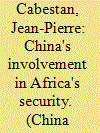

|
|
|
|
|
| Summary/Abstract |
China has been much more involved in Africa's economy and trade than in its security. However, over the past decade or so, China has increased its participation in the United Nation's Peacekeeping Operations (UN PKOs), particularly in Africa. It has also taken steps to better protect its overseas nationals and, in 2017, established a naval base in Djibouti. This article focuses on the participation of China's People's Liberation Army in the United Nation's Multidimensional Integrated Stabilization Mission in Mali (MINUSMA) since 2013. It aims to unpack the diplomatic process that led China to take part in this mission and to analyse the form of this participation. Mali was the second time (the first being in South Sudan in 2012) that China opted to deploy combat troops under the UN banner, underscoring a deepening involvement in PKOs and an increasing readiness to face risks. Finally, this article explores the implications of China's participation in the MINUSMA for its foreign and security posture as a whole. Often perceived as a realist rising power, by more actively participating in UN PKOs China is trying to demonstrate that it is a responsible and “integrationist” great power, ready to play the game according to the commonly approved international norms. Is this really the case?
|
|
|
|
|
|
|
|
|
|
|
|
|
|
|
|
| 8 |
ID:
138344
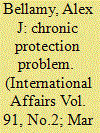

|
|
|
|
|
| Summary/Abstract |
The Democratic Peoples' Republic of Korea (DPRK) is arguably the world's most chronic abuser of human rights. In an unprecedented move, a Commission of Inquiry established by the UN's Human Rights Council accused the DPRK government of systematic violations of human rights amounting to crimes against humanity. In so doing, the Commission succeeded in putting human rights in the DPRK on the global agenda. Within months the UN's General Assembly and Security Council had joined the human rights body in examining the issue. This article explains the emergence of this new engagement with human rights in the DPRK, showing its relation to the ‘Responsibility to Protect’ principle. It charts the growing sense of frustration felt at the lack of progress on human rights in DPRK and shows how this was manifested in the General Assembly's decision to pursue the Commission's recommendations and call on the Security Council to take concrete steps. Despite this, however, the article shows that there are powerful obstacles in the way of a more robust international approach to human rights in the DPRK and counsels a less confrontational approach focused on engaging China and building trust within the Security Council.
|
|
|
|
|
|
|
|
|
|
|
|
|
|
|
|
| 9 |
ID:
143594
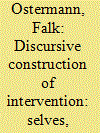

|
|
|
|
|
| Summary/Abstract |
This article analyses French executives' and lawmakers' legitimisations of the intervention in Libya with the aim of understanding the discursive construction of intervention. It investigates the arguments in favour of intervention and the oppositions they were confronted with. To these arguments belong a re-evaluated democratic legacy of France, an identification with the Libyan people, and a debate on Responsibility to Protect and the rule of law in world politics, which have a broader relevance for French actorness abroad. The article applies the Essex School discourse theory and techniques from Interpretive Policy Analysis on executive speeches and parliamentary documents for structuring the debate and for estimating the strength of ideas in their interdiscursive configuration. An ideal-typical explanation of the legitimisation of intervention and of the choice of one policy over another is made. The article argues that going to war in Libya equated to a question of cultural appropriateness.
|
|
|
|
|
|
|
|
|
|
|
|
|
|
|
|
| 10 |
ID:
147974
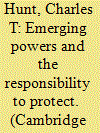

|
|
|
|
|
| Summary/Abstract |
The perceived clash of norms associated with the emergence of rising powers is nowhere more pronounced than in relation to the responsibility to protect (RtoP). However, attempts to explain rising powers’ engagement with norms such as the RtoP are often limited and limiting in what they can tell us. Orthodox models portray predominantly linear and diffusionist logics of norm evolution that underplay the complex interaction implicit in unpredictable outcomes at the systemic level. This article identifies a range of factors that drive participation (or generate hesitation) amongst emerging powers in the development and application of the RtoP. It proceeds to illustrate how changes in normative behaviour emanate from top-down and bottom-up processes as well as the feedback between them. It argues that norm evolution is consequently a unique and emergent outcome of complex international society and therefore argues for using complexity thinking as a heuristic to augment current models and explanations of the evolution of norms in the international system.
|
|
|
|
|
|
|
|
|
|
|
|
|
|
|
|
| 11 |
ID:
146684
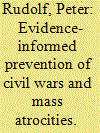

|
|
|
|
|
| Summary/Abstract |
The prevention discourse in all its forms has tended to ignore or at least downplay the epistemic problems with prevention. Forecasting political violence is not as easy as the debate on early warning often assumes. Effectively forestalling political violence and mass atrocities is much more difficult than the often used rhetoric of a ‘tool box’ implies, which creates the impression that one knows what works. An evidence-informed prevention policy needs to be aware of the limits of our knowledge, but at the same time knowledgeable of what social science research can provide – even if the results are provisional, often controversial and fraught with methodological problems.
|
|
|
|
|
|
|
|
|
|
|
|
|
|
|
|
| 12 |
ID:
151305
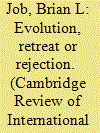

|
|
|
|
|
| Summary/Abstract |
This paper outlines the development and evolution of the normative positions of China, Brazil and India on issues surrounding the responsibility to protect (R2P) by charting their engagement in the ‘institutionalized conversation’ within the United Nations. In doing so, it seeks to dispel characterizations of these states as having adopted individual or common positions that either wholly reject or accept R2P. The nuances of the adaption and adoption of their postures need to be appreciated. Indeed, of the three component ‘pillars’ of R2P, they find themselves in general accord regarding Pillar One (state responsibility) and Pillar Two (prevention and assistance). It is on Pillar Three (reaction and response) that they diverge from each other and find themselves most at variance with ‘Western’ agendas of intervention and regime change. This divergence is most sharply drawn at present, in light of the Libyan and ongoing Syrian experiences.
|
|
|
|
|
|
|
|
|
|
|
|
|
|
|
|
| 13 |
ID:
149064
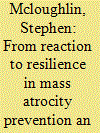

|
|
|
| 14 |
ID:
183762
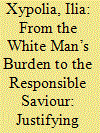

|
|
|
|
|
| Summary/Abstract |
In recent years, there has been renewed interest in conceptualising the political nature of human rights as well as intense debate over the precise nature of Western biases in the whole project. Spurred by the fresh renewal of radical theory, a growing body of literature explores the role that racialized power hierarchies have played in the human rights project through the Responsibility to Protect Doctrine. Drawing from critical human rights scholarship, this article explores the way human rights have been employed as a legitimising discourse for justifying military intervention in Libya. In doing so, it illustrates the Eurocentric conceptualisation of power, power hierarchies and subjectivities.
|
|
|
|
|
|
|
|
|
|
|
|
|
|
|
|
| 15 |
ID:
138560
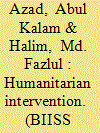

|
|
|
|
|
| Summary/Abstract |
Humanitarian intervention based on the idea called ‘The Responsibility to Protect (R2P)’ leaves little room for controversy because such intervention is meant to save populations from genocide, war crimes, ethnic cleansing and crimes against humanity. In effect, the R2P is a step by step process for dealing with an internal conflict with significant security implications. It is a composite whole of three elements and each of which tries to deal with an internal conflict with due consideration to security at three levels, i.e., human security at the national level, regional security and international security. In view of the fact that contemporary world witnesses, till to date, many internal conflicts of various nature, intervention in such cases, henceforth, should be guided by the spirit of R2P. This would enable the conflicts to find their respective end in a peaceful and non-violent manner in consonance with international laws and norms. The paper attempts to study the various elements of R2P from a comprehensive security perspective with recommendation for its application in all future internal conflicts including the current one in Syria.
|
|
|
|
|
|
|
|
|
|
|
|
|
|
|
|
| 16 |
ID:
120049
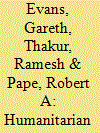

|
|
|
| 17 |
ID:
145871
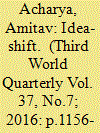

|
|
|
|
|
| Summary/Abstract |
An ‘idea-shift’ is taking place that may be of greater consequence for global governance than is the ongoing ‘power shift’ or the rise of new powers. A number of non-Western thinkers and practitioners - who may be called idea-shifters - have contributed to new concepts and approaches that have radically altered the way we think about development, security and ecology, among other areas. Their ideas are often dismissed or downgraded in the West as imitation, or the product of the Western education of their creators, or of partnership with Western collaborators, governments, donor agencies and multilateral institutions dominated by the Western powers. Challenging this view, this essay holds that ideas from the postcolonial world, its thinkers and policymakers have played an important role in the making of the postwar norms of governance, such as universal sovereignty, human rights, international development and regionalism. Moreover, some of the important recent ideas about development (human development from Mahbub ul Haq and Amartya Sen), security (responsible sovereignty from Francis Deng and colleagues) and ecology (sustainable development from Wangari Maathai) have come from people who, while trained in the West, are deeply influenced by their local context or point of origin. Appreciating how much this local origin and context matters allows us to consider these as ‘ideas-from-below’ and a powerful driver of the unfolding global idea-shift.
|
|
|
|
|
|
|
|
|
|
|
|
|
|
|
|
| 18 |
ID:
153148
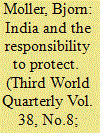

|
|
|
|
|
| Summary/Abstract |
‘Responsibility to protect’ (R2P) is an ‘emerging norm’ of international relations, which has been invoked with the intervention in Libya in 2011. Even though this intervention was demanded by several Third World countries and organisations, these have subsequently had second thoughts about the matter and have come to regard R2P as Western neo-imperialism. This article seeks to explain this apparent paradox, with a special focus on India. It also identifies possible compromises by advocating a broader approach to R2P, stressing the responsibility to prevent and to rebuild. It also draws attention to ‘R2P lite’, including the protection of civilians in armed conflicts.
|
|
|
|
|
|
|
|
|
|
|
|
|
|
|
|
| 19 |
ID:
145891
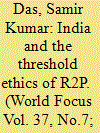

|
|
|
|
|
| Summary/Abstract |
India’s foreign policy in the post-Cold War period has become a subject of one of the most acrimonious debates in her recent past history. While it is often denigrated as ‘firefighting’, ‘ad hocism’ and ‘drift’, many other commentators propose to interpret it as one driven by realpolitik interests paying scant regard to her ideological and ethical commitments. Never before in her history has Indian foreign policy faced such an ethical crisis as it is facing now.
|
|
|
|
|
|
|
|
|
|
|
|
|
|
|
|
| 20 |
ID:
166581
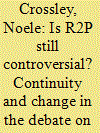

|
|
|
|
|
| Summary/Abstract |
Is the responsibility to protect (R2P) still controversial? The question is important because if R2P was no longer controversial, this would suggest that the principle is on track to consolidation as an international norm. The article assesses the impact of 16 years of sustained R2P advocacy and its influence on arguments within the scholarly community, and discusses the impact this engagement has had on the outline and substance of the principle itself. A survey of the development of the academic debate since 2005 suggests that the ‘responsibility to protect’ has successfully replaced ‘humanitarian intervention’ in international discourse, but that the principle remains controversial, especially beyond the policy community, particularly in the world of academe, in the humanitarian aid sector and religious organizations and with states with a colonial past.
|
|
|
|
|
|
|
|
|
|
|
|
|
|
|
|
|
|
|
|
|